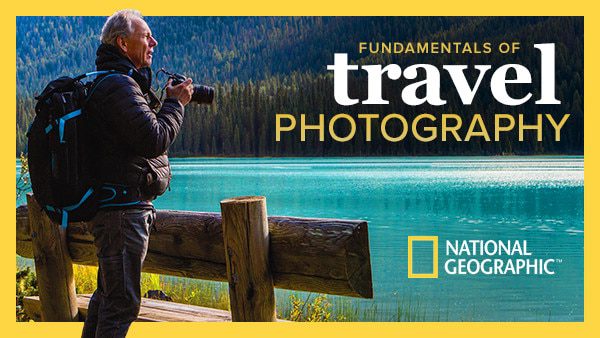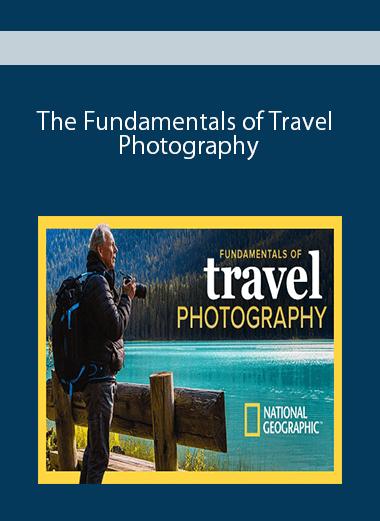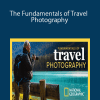The Fundamentals of Travel Photography
$234.00 Original price was: $234.00.$44.00Current price is: $44.00.
The Fundamentals of Travel Photography
Product Delivery: You will receive a download link via your order email
Should you have any question, do not hesitate to contact us: [email protected]
 The Fundamentals of Travel Photography
The Fundamentals of Travel Photography
Great travel photographs—whether they’re of a trip to the local zoo or a mountain village halfway around the world—involve a good eye, a good camera, and a moment of inspiration. But above all, they require the ability to tell a captivating story.
Hide Full Description
Take a look through any recent issue of National Geographic Traveler, the gold standard for travel photography, and you will see much more than just a series of individual location shots. They’re stories, with an editorial thread that unites them and allows viewers to better appreciate places and people they might never encounter on their own.
The skills and techniques National Geographic photographers use to make exotic destinations familiar (and familiar destinations exotic) are ones anyone with a willingness to learn can master, whether you’re pursuing a career as a professional photographer or you just want to take more striking pictures of your everyday journeys. Transform the way you think about recording your travels by studying how travel photographers
overcome challenges and avoid photographic clichés;
capture the hidden spirit of people and architecture;
select the right equipment lenses for the right shots;
navigate the beauty and chaos of festivals and public events; and
uncover authentic images of native cultures and traditions.
Your own photographs will start to express not how everyone else sees the world—but how you see it.
In The Fundamentals of Travel Photography, National Geographic photographer Bob Krist shares his lessons, tips, tricks, techniques, and insights directly with you. These 24 comprehensive lectures are packed with some of the best photographs from Mr. Krist’s broad career as a photographer for numerous travel publications. In them, you’ll learn what it takes to get compelling, illuminating, storytelling pictures of the many places you go in life. You’ll also get intriguing insights into the mindset of a working travel photographer: both the artistry behind the craft and the practical skills required to take great pictures when you’re far from familiar territory. With Mr. Krist’s guidance, you’ll start to engage with your surroundings the same way National Geographic photographers do on their many assignments.
See the World like a Travel Photographer
Done right, traveling with a camera can open doors and intensify your experience of people and places rather than simply capture a static postcard image. Every lecture of The Fundamentals of Travel Photography covers the information you need to tell a complete story about your travels. (Mr. Krist suggests thinking of it as a list of ingredients every story recipe needs.) These include:
landscapes
people
architecture
public events
wildlife
You’ll also spend plenty of time learning how professional photographers innovate and work around common obstacles to great shots. Perhaps most surprising of all is that these obstacles aren’t necessarily confined to the most hard-to-get-to places on Earth. You can even encounter them while taking photographs of a neighborhood walk.
Mr. Krist also shares a wealth of practical knowledge a good travel photographer needs, including how to organize and publish your photographs, how to protect your gear from theft, and what lenses to bring for different types of travel. You’ll learn ways to tackle bad weather, language barriers, money and time limitations, and so much more.
Take Great Shots—Wherever You Are
Throughout The Fundamentals of Travel Photography, Mr. Krist shows you the intricate thought process behind how he gets great shots in places ranging from Philadelphia to Bora Bora.
Each lecture offers plenty of takeaways you can put to use on your next trip, such as:
How to Get Personal: When getting up close to an individual you want to photograph, make sure to keep a distance of three or so feet (what we in the West consider “personal space”). Any closer, and your subject might begin to feel a bit encroached upon, which could ruin your shot.
How to Get Animal Glamour Shots: To improve your portrait shots of animals, think in terms of taking a portrait of a human. You want to concentrate on your subject’s eyes. Also, many of the same conditions that make pleasing portraits of humans—soft light, a non-distracting background—do the same for wildlife portraiture.
How to Avoid Taking Someone Else’s Picture: Even a clichéd image can be rendered in creative ways. One example Mr. Krist uses involves Philadelphia’s “Rocky footprints.” He suggests using a wide-angle lens to put the prints in the foreground and the city in the background, rather than just a close up of the prints like everyone else usually takes.
How to Experiment with Video: More and more, travel photographers are experimenting with video stories. If you’re taking video, remember to keep a simple story structure in mind. Open with your best visual, introduce your main subject, show the subject going through a change, and wrap up with a visual reference to your opening.
Get immediately download The Fundamentals of Travel Photography
How to Get Interesting Crowd Shots: Whether it’s a major parade or a neighborhood block party, arrive early. Find out when and where the participants will gather and organize. During this pre-event phase, you can usually move among the participants and discover unique portraits and magical moments of interaction you wouldn’t otherwise.
How to Work around Clouds: While it’s not the ideal lighting condition, you can still shoot landscape photographs when the weather is overcast. Mr. Krist recommends finding compositions that have no sky. (After all, a flat gray sky is boring.) With no sky in your composition, the soft light of cloud cover can really make the color in a shot pop.
A Lavishly Illustrated Teaching Tool
For over 35 years, Mr. Krist has traveled around the world taking photographs for prestigious publications including National Geographic Traveler, Smithsonian, and Islands. During that time, his assignments have taken him to over 140 countries on all seven continents.
The author of Spirit of Place: The Art of the Traveling Photographer, Mr. Krist has taken photographs for numerous books, including the New York Times best seller, In Tuscany (a journey he recounts in one lecture).
Lavishly illustrated with Mr. Krist’s photographs, the lectures in The Fundamentals of Travel Photography also serve as a visually exciting travelogue of some fascinating places, including:
the architectural wonders of Chicago,
the French Quarter of New Orleans,
the tropical marvels of the Caribbean, and
the buzzing city streets of Havana.
“In the end,” says Mr. Krist, “great travel photography is all about the storytelling. Now more than ever, we travelers need to share photos that help to improve our understanding of places and people all over the world. As storytellers sharing the visual tales of our travels, we can act as small points of light that help everyone see the beauty and the humanity of this very small world in which we live.”
For many of us, being a professional travel photographer is a dream job; you just grab your camera and explore. But as Mr. Krist shows, there’s more to it than that. There’s a knowledge you have to take with you, regardless of your destination.
Delivery Method
– After your purchase, you’ll see a View your orders link which goes to the Downloads page. Here, you can download all the files associated with your order.
– Downloads are available once your payment is confirmed, we’ll also send you a download notification email separate from any transaction notification emails you receive from IMC.sale.
– Since it is a digital copy, our suggestion is to download and save it to your hard drive. In case the link is broken for any reason, please contact us and we will resend the new download link.
– If you cannot find the download link, please don’t worry about that. We will update and notify you as soon as possible at 8:00 AM – 8:00 PM (UTC+8).
Thank You For Shopping With Us!





7 reviews for The Fundamentals of Travel Photography
There are no reviews yet.